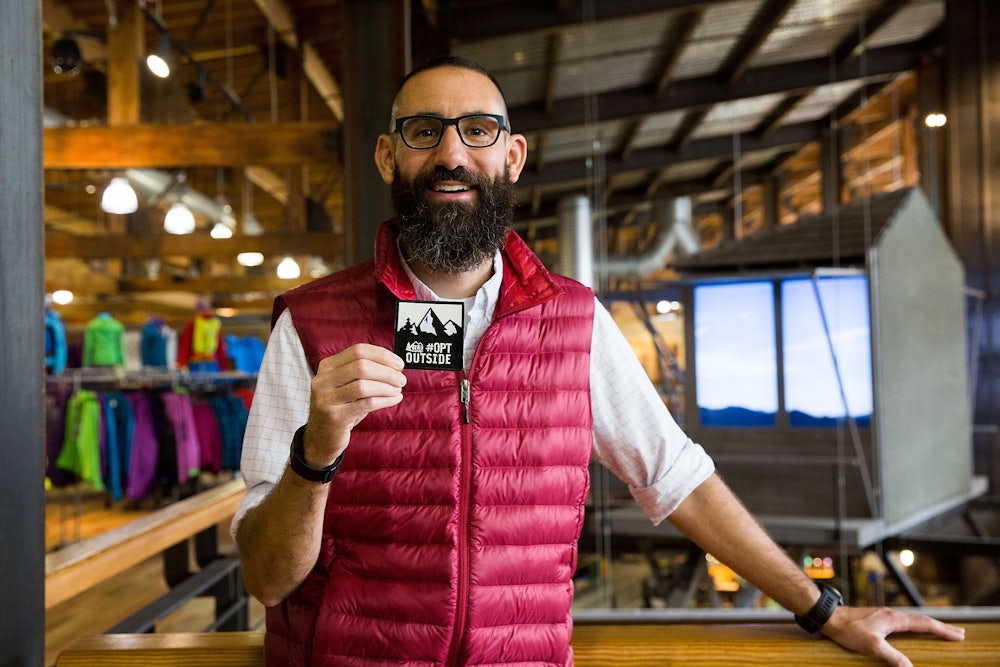Of all the marketing campaigns, the most brilliant are the ones that flatter the consumer into thinking he doesn’t care about material goods. It worked for Patagonia, whose ongoing “Don’t Buy This Jacket” campaign instructs shoppers to restrain themselves, offering up a photo of one of their discreetly distinctive fleece jackets, then telling you to refrain from buying it impulsively, or lustfully, or to otherwise crassly consume a fleece you might not actually need. The ads explain that shopping is bad because the garment industry is wasteful and all that. But if you must buy something, perhaps you might wish to consider the least-sinful option—a Patagonia fleece. “[T]his is a 60% recycled polyester jacket, knit and sewn to a high standard; it is exceptionally durable, so you won’t have to replace it as often.” The line is buried in a great holding-forth about the environment, as if it were a public service announcement, not the brand itself telling you to buy its jacket. And why wouldn’t you, after having been told that the Patagonia consumer is someone who thinks before he or she buys?
Recently, fellow upscale-fleece-purveyor REI joined the anti-shopping marketing bandwagon. The outdoorsy retailer is not just closing on Black Friday: It has a hashtag, #OptOutside, to promote this fact, and a whole system where you can signal the fact that rather than going shopping on a day when stuff’s on sale, you’re going to be scaling a mountain, or paddling down a creek, or at any rate doing something scenic and discreetly expensive.
As ad campaigns go, the anti-shopping, pro-wholesomeness approach on the surface more appealing than, say, that other thing companies seem to be doing these days, where they go think-piece viral through a now-predictable pattern of offending and apologizing. Oh look, Bloomingdales thinks date-rape is OK! Oh wait, no it doesn’t! And then the next thing you know—whether this was the store’s explicit plan or not—you’re on their website drool-scrolling this season’s denim. But this is in its way even more nefarious, because it’s about telling certain consumers that their consumption somehow doesn’t count. It’s about encouraging virtue-signaling of the most pointless, and expensive, kind.
The genius is in convincing high-end shoppers that they’re better people than the rest of us. My all-time favorite example in this area remains the time when a bunch of fashion types wore their clothes inside out because garment workers, or something. I mean, the point was to reveal the labels of their clothes, to show that they cared where their clothes came from, in the traceability sense. A noble goal, in theory, but also an opportunity to show off… designer labels. The kicker was designer Stella McCartney earnestly posing in an inside-out Stella McCartney top.
The outdoorsy version takes things one step further, though, bringing into play not just garment-industry ethics but the eternal Stuff versus Experiences non-debate, wherein people who prefer a dangerous mountain hike to a dangerous-in-its-own-way trip to Sephora get to feel smug. Never mind that experiences (certainly the Instagram-worthy ones) have a way of costing at least as much as stuff, thanks to travel costs, not to mention the cost of all that REI gear. Preferring a dangerous mountain hike to a dangerous-in-its-own-way trip to Sephora doesn’t make you superior. Spending time in nature doesn’t necessarily coincide with preservation. But it’s coded-male, coded-upper-class to choose hiking over, say, scouring lower Manhattan for cheap handbags, so clearly the former activity is just better.
By planting itself firmly on Team Experiences, REI has managed to symbolically reclassify the stuff it sells as not-stuff. Patagonia’s fleeces are part-recycled? REI’s are made out of antimatter. You are not-shopping by shopping there.
REI’s protest of Black Friday has gotten a tremendous amount of sympathetic coverage, from The Today Show to The Onion. And it’s somewhat understandable: They’re giving their workers a paid day off at a time of year when that’s likely to be particularly appreciated. As sancti-marketing goes, a day off certainly beats vegan Canadian handbag company Matt & Nat’s recent, now-removed job ad for an unpaid copywriter, an unfortunate choice for a company that puts “ethics” front and center.
The move is also about highlighting the fact that REI is a cooperative, which is less straightforwardly positive. It involves asking customers to pay $20 to become members, which, like the hashtag campaign, fits neatly into the message that paying retail is a noble act. The REI shopper has $20 to spare, $20 to invest in a future filled with adventure vacations, thus giving the brand a certain exclusivity.
In a column otherwise praising the new minimalism, contemplative-phase David Brooks briefly returned to the stronger, more cynical themes of his earlier work: “One of the troublesome things about today’s simplicity movements is that they are often just alternate forms of consumption,” adding, “There’s a whiff of the haute bourgeoisie ethos here—that simplification is not really spiritual or antimaterialism; just a more refined, organic, locally grown and morally status-building form of materialism.” Precisely. I’d add that there’s something worse about the materialism that poses as the opposite. I’d take sponsored content over the sponsored content posing as a good deed.
To be clear, the problem with sancti-marketing isn’t that specific companies’ ecological or labor claims are untrue. It’s great if companies behave ethically, and fair that they’d want to use this to their advantage. I’d just like it if we could admit that shopping is shopping, stuff is stuff. New hiking boots purchased to look out over a vista aren’t somehow less yay-new-shoes than new patent leather ballet flats worn to explore a city, which is also, let it be known, a form of Outside.
